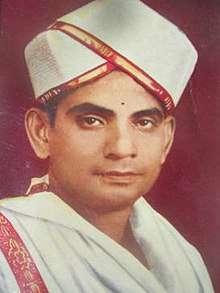Ratnavarma Heggade
Dharmasthala Ratnavarma Heggade was an Indian philanthropist,educationist and legislator who is best known for being the hereditary administrator(Dharmadhikari) of the Dharmasthala Manjunatha Temple from 1955 to 1968.[1][2]
Dharmasthala Ratnavarma Heggade | |
|---|---|
 | |
| Personal | |
| Born | |
| Religion | Jain |
| Senior posting | |
| Based in | Dharmastala, Karnataka, India |
| Period in office | 1955–1968 |
| Predecessor | Manjayya Heggade |
| Successor | Veerendra Heggade |
| Post | Dharma Adhikari of Dharmasthala Manjunatha Temple |
Early life
Born in a family called the ‘’Pergade’’. The Pergades were the feudal lords of the temple town of Dharmasthala. Ratnavarma completed his early education in Mangalore.[3] He married Ratnamma Heggade (née Shetty),the daughter of a wealthy landlord Sankappa Shetty of Mudabidri.The couple were parents to five children, four sons(veerendra,surendra,harshendra, rajendra) and a daughter (Padmalata).[4]
Career
Ratnavarma Heggade’s public life began when he succeeded to the post of Dharma Adhikari after his uncle Manjayya Heggade died in 1955. He transformed the village of Dharmasthala to a modern township, developing the land and buildings. He also established an education trust, to establish educational institutions during this period and served as legislator in the Karnataka Legislative Assembly from 1957 and 1962.[5] Heggade also initiated plans to erect a statue of Bahubali similar to ones at Venur, Karkala and Shravanabelagola.His son Veerendra Heggade took over the project and completed the Bahubali statue project after his untimely death in 1968.
Legacy
The Ratnavarma Heggade Tulu Drama Award is named after Ratnavarma. The prize is awarded each year during a play-writing competition sponsored by Tulukoota, a Tulu language monthly magazine.[6] A Stadium in Ujire, India is also named after him.[7][8]
References
- Long, Roger D.; Wolpert, Stanley A. (2004). Charisma and Commitment in South Asian History. Orient Blackswan. p. 368. ISBN 978-81-250-2641-9.
- Bureau, Bhat R.K. "Dharmasthala - Promoting Universal Peace and Brotherhood". Mangalorean.com. Retrieved 28 September 2010.
- Shet Saldanha, I.J. "Fight for Survival". Mangalore Today. Retrieved 28 September 2010.
- Daijiworld News Network. "Matrushri Ratnamma Heggade". Daiji world. Retrieved 28 September 2010.
- "STATISTICAL REPORT ON GENERAL ELECTION, 1957 TO THE LEGISLATIVE ASSEMBLY OF MYSORE" (PDF). Election Commission of India. Retrieved 28 September 2010.
- "Applications invited for drama award". The Hindu. Chennai, India. 5 July 2004. Retrieved 2 November 2008.
- News Bureau. "VTU athletic meet begins on Wednesday". Times of India. Retrieved 10 November 2009.
- Staff Correspondent (11 December 2009). "Tulu convention off to colourful start at Ujire". The Hindu. Chennai, India. Retrieved 11 December 2009.